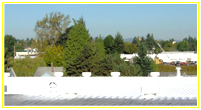10013 NE Hazel Dell Ave. #425
Vancouver, WA 98685
Ph:(360)573-2629
Fax: (360)573-2581
E-Mail:info@westcoatsys.com
Have no leaks?
Need to restore the aesthetic new looks of your building? Reduce energy costs and thermal wear and tear?
Install a new reflective coating for far less than water-proofing.
Learn more ...
Faq
Question 1: How much does a roof system like this cost?
When compared to a conventional Hot built-up tear-off and re-roof, you can save as much as 30 to 60% of your re-roofing bill. Add to this longer life and an easier roof to maintain and the money saved is hard to compute.
Question 2: How long does it last once it's on my building?
When installed over a prepared surface at a rate of 12 gals and 3lbs of chopped fiberglass this roof system lasts for 20 or more years.
Question 3: No really. How can it last 20 years? Not even a new hot roof will last 20 years?
It will last 20 years because the materials that make up our roof system are water based, not solvent-based like other roof systems. The real secret to longevity is the high quality of preparation and labor that goes into the work. It's not enough to just last for 20 years, it should not leak either!
Question 4: What makes water based products so special?
Sunlight is extremely hostile to solvent based roofing materials such as hot tar and solvent based coatings. For this reason, most roofs are installed with a protective top-layer such as gravel rock, mineral granules or a mineral cap-sheet. In contrast water based products contain no solvents and are nearly impregnable to sunlight, making them an excellent weathering surface for roofs old or new.
Question 5: What if moisture exists in my old roof? Shouldn't I tear it off and start over?
Our system is vapor permeable. Trapped moisture can escape as vapor without blistering. In most cases of excess water under the roof membrane and insulation, water is isolated near your roof leaks. We can bring you a core cut from these areas and say "tear it off" or we can save you money and simply install vapor vents to evaporate water and stop water from getting in by fixing your roof.
Question 6: How Strong is this roof system?
The fiberglass strands distributed throughout this system have a greater tensile strength than steel. Stress created by thermal expansion and building movement are greatly reduced. The result is a strong membrane much less likely to split over extended periods of time.
